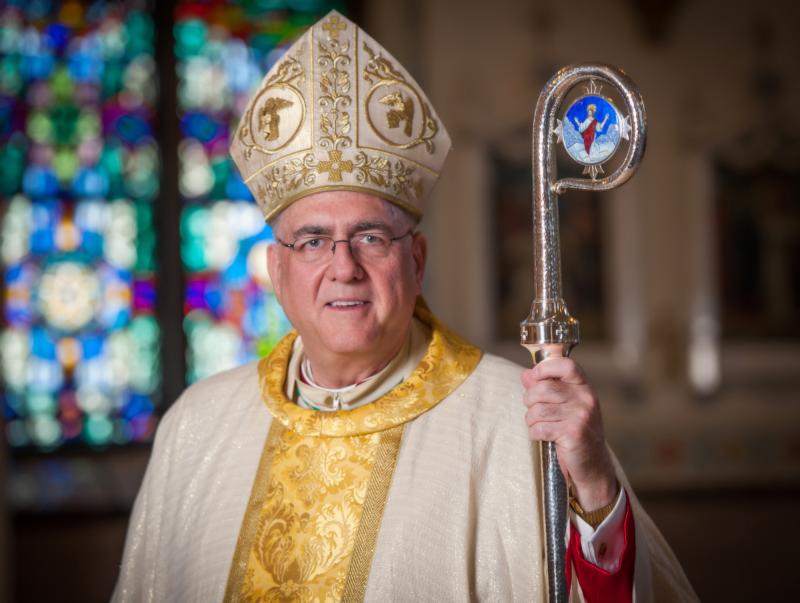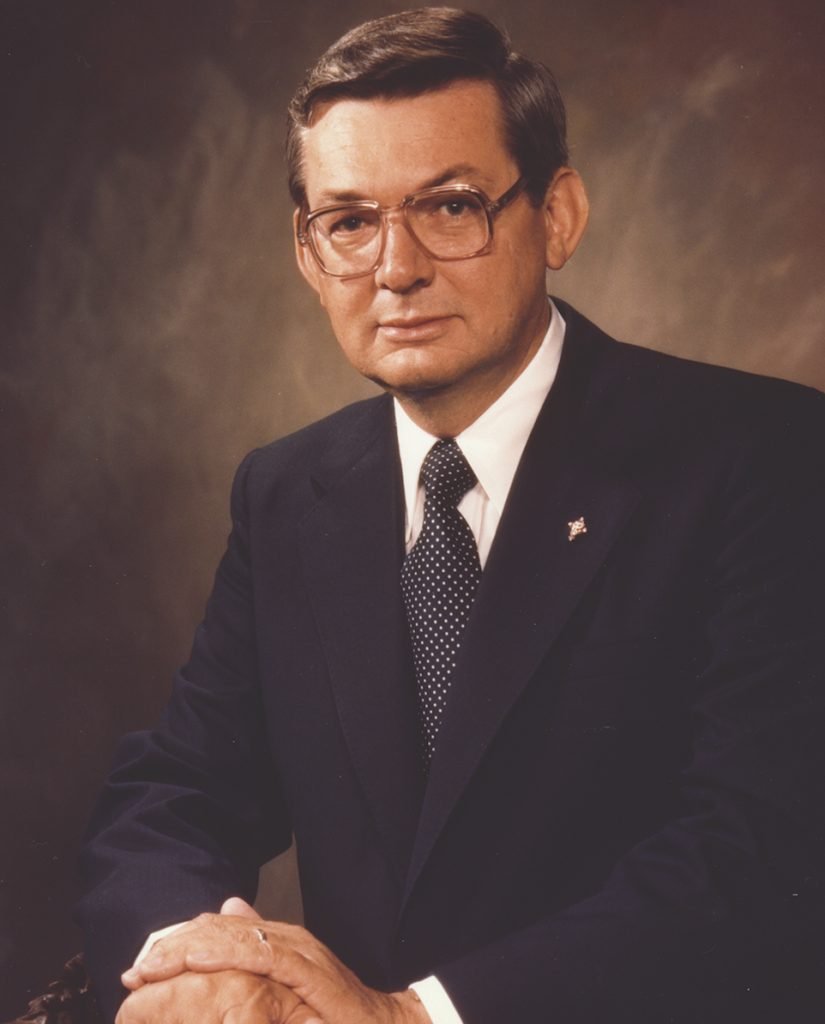
by Archbishop Joseph F. Naumann
Kansas lost one of its human wonders, a state treasure, with the death on Feb. 16 of Virgil Dechant, the past Supreme Knight of the Knights of Columbus. Virgil served as the 12th Supreme Knight and he served longer than any of his predecessors.
In reflecting on Virgil’s life, it seems clear that there were four overriding principles that guided him: faith, family, fraternity and service. Faith was the bedrock of his life. It was the foundation of everything that he did. Virgil’s faith was an uncomplicated faith, but this in no way implies that it lacked depth.
Growing up in rural Kansas in a family of great faith, Virgil was immersed in a community of faith. When you live close to nature, it is difficult not to believe in a creator.
When you are surrounded by the beauty of the created world and encounter daily the complexity of nature’s intricate design, it is hard not to believe in a divine designer.
Personally, I think that it takes much more faith to be an atheist than a Christian. To believe that the cosmos, the universe, the world, and the amazing capacities we possess as human beings all happened just by chance, against all odds — this takes incredible faith.

Virgil’s faith was, however, not just in a creator God, but in a God who revealed himself in the second person of the Trinity, Jesus Christ. Virgil grew up in a deeply Catholic family and community that helped him discover from a young age this God who pursues us by sending his son Jesus into the world to liberate us from our self- imposed slavery to sin, who desires friendship with us, communion with us. He believed in a God of revelation who immersed himself in our humanity so that we could share in his divine life.
If you drive through rural Kansas, you see the physical symbols of this priority of faith in hearts of so many of our forebears in the incredible beauty of churches that are the center and most prominent buildings in town.
Virgil learned as a young boy to love Our Lord present in the Eucharist. He received from his parents a great and beautiful devotion to Mary, with the family rosary being a central part of their family life.
Virgil and his wife Ann gave a great witness of devoted married love for 68 years. Both he and Ann had rich experiences of Catholic family life from their parents.
It was only natural that Virgil placed the highest importance on his vocation as husband and father. He understood that this was the place where he was first and foremost called to live his faith.
One of his contributions to the Knights of which Virgil was proudest was making the Knights into a much more marriage-and- family-friendly fraternity.
It was inconceivable to Virgil that the wives of the Knights would not be included in their meetings. He understood that a key part of the mission of the Knights was to help its mostly married members become better husbands and fathers who cherished, honored and respected their wives as at least their equals.
Virgil understood that the first fraternity is the family!
It is no mere coincidence that what motivated Virgil, as a young man, to become more involved with the Knights was what on the surface appeared to be a tragedy. It was a car accident at age 18 in which he sustained some significant injuries and endured a long period of recuperation that actually motivated him to become more involved in the Knights of Columbus.
The faithfulness of his brother Knights visiting him nightly at St. Anthony’s Hospital in Hays made a lasting impression on Virgil.
It became clear to him of the importance of a fraternal organization that helped to develop these deep bonds of friendship.
He experienced firsthand the value of virtuous friendships that enrich every moment of life, but especially at times of adversity and difficulty.
Virgil understood that being a disciple of Jesus meant being part of a community of disciples, where faith and virtue are nurtured and shared.
Of course, he had a deep personal friendship with Our Lord developed through a life of prayer, receiving the Eucharist and Marian devotions that allowed Our Blessed Mother to draw him closer to her son.
Virgil knew that Jesus did not entrust the Gospel to an individual, but to a community of disciples. For the faith to be experienced, it had to be shared and sharpened in a fraternity and community of disciples.
Virgil saw through the fallacy of so many in our time that one can be spiritual without being religious. As Christians, we believe that God can only be properly understood as a community of persons, the Trinity. To follow this triune God then, our faith has to be nurtured and shared in fraternity, friendship and fellowship.
Virgil grasped how, united in the service, the Knights could do so much for church, country and the world. Virgil realized the strength in numbers. He saw the power of a united fraternity in caring for the unborn, the disabled, the widow, the orphan and the poor.
Each time I have gone to the Knights national convention, I come away inspired and proud to be Catholic. Supreme Knight Carl Anderson’s report recounts the amazing service — both in dollars and hours donated — that the Knights do annually, not just in our country, but throughout the world.
The Knights’ support for the protection of human life, for Catholic education, for vocations to the priesthood and religious life, for those with disabilities, for those whose religious freedom is threatened and for the poor is astounding!
In my conversations with Virgil over the years, I was always impressed by his wisdom, his energy, his passion, but most of all by his gratitude and his sense of divine providence guiding his life. In many ways, Virgil epitomized the strengths that are characteristic of Kansas, especially rural Kansas.
He was smart, practical, with superb organizational skills and an incredible work ethic. He was a visionary, but not one with his head in the clouds, but his feet firmly planted on planet Earth.
He was an entrepreneur who did not waste time complaining about problems, but was always focused on finding and implementing solutions. He was not intimidated by huge challenges, but energized by them.
Virgil lived an amazing life. He had popes, prelates, saints and presidents for friends.
He had every knighthood the church could bestow. However, titles were not important to him. His desire was to complete the work Our Lord had entrusted to him on earth as a man of faith, family and fraternity, who served the Lord tirelessly by mobilizing his brother Knights to care for the vulnerable, the poor and those on the peripheries.
If you are not a Knight of Columbus, I encourage you to join this amazing fraternity of Catholic men and their families.
If you are already a Knight, I encourage you to honor Supreme Knight Virgil Dechant by becoming even more involved with your council.
If the church did not have the Knights of Columbus, we would have to invent them!

